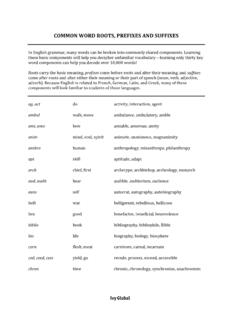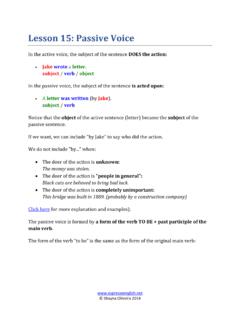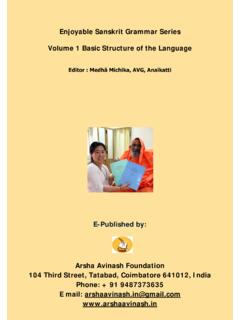Transcription of SAT GRAMMAR REVIEW - Ivy Global
1 SAT GRAMMAR REVIEW . I. Nouns Error in subject-verb agreement These errors occur frequently in Error in noun agreement Identifying Sentence Errors questions. The subject is the noun that is performing the verb. The verb must agree with the subject in number. Singular subjects take singular verbs, and plural subjects take plural verbs. Your cat bites me. (singular). Your cats bite me. (plural). Sometimes multiple subjects perform the verb together. This is called a compound subject. A. compound subject is joined together by the word and', and takes a plural verb. Tony and I went to the store. Peter Petrelli and Hiro Nakamura travelled together through time. If the word and' is not present, you have a subject plus one or multiple tag-alongs. Tag-alongs often occur with the words and phrases of, in, as well as, with, along with, together with, in addition to, no less than, rather than, and like.
2 These do not change the relationship between the true subject and the verb. The juice in those bottles has expired. The house made of bricks and cement was built by my grandfather. Robert along with Hafeez, Michael, and John is going to see the new Judd Apatow movie. My mother, like your parents, enjoys gardening. The farmer together with the milkman has gone to visit my grandmother. Alice as well as Gregory enjoys mathematics. In addition to subjects, any other corresponding nouns in the sentence must agree in number. Parker and Hanley studied hard to become a great lawyer. (incorrect). Parker and Hanley studied hard to become great lawyers. (correct). It is easy to confuse the singular and plural forms of certain nouns. Here are some to keep straight: Singular alumni alumnus/alumna antennae antenna criteria criterion data datum phenomenon Plural medium Ivy Global millennium media symposium millennia phenomena symposia II.
3 Pronouns Error in pronoun case Error in pronoun-antecedent agreement These errors occur frequently in Error in pronoun-verb agreement Identifying Sentence Errors questions. Error in pronoun consistency Pronouns are words that take the place of and refer back to previously mentioned antecedent nouns. Like their noun counterparts, pronouns can take a subject or object role in the sentence. Each personal pronoun has a nominative (subject) and objective (object) case. She and I went to the store. (nominative). Nominative Objective Jerry took him and me to the dance. (objective). I me we us If you're unsure, test with a single pronoun. you you he him Who is a subject pronoun, and whom is an object pronoun. she her Who went to the store? (nominative) it it Whom did Jerry take to the dance?
4 (objective) they them who whom Pronouns that come after a preposition (by, of, for, after, with, between, except, without, etc.) are considered objects of the preposition and take the objective case. Everyone did well on the exam except him and her. Sarah left without John and me. Please keep this between you and me. By whom was this wonderful short story written? Constructions with than: whenever a pronoun follows than, it should be in the subjective case. A. following verb is always understood, if not always articulated. I am taller than he (is). Sarah is better at math than I (am). Pronouns must agree in number with their antecedents. If the antecedent is singular, the pronoun must be singular. If the antecedent is plural, the pronoun must be plural. A student will catch their mistakes if they proofread.
5 (incorrect). Ivy Global A student will catch his or her mistakes if he or she proofreads. (correct). Students will catch their mistakes if they proofread. (correct). Verbs must agree in number with subject pronouns. It is easy to make a mistake with some of the less basic pronouns. When in a subject position, some of these pronouns always take a singular verb and others always take a plural verb. Each of the apples you bought is bruised. Singular Pronouns Everything that my uncle does turns out to be a success. each either Neither of the twins knows how to cook. neither someone Nobody is at home. anyone everything Many are cold, but few are frozen. somebody nobody anybody everyone Exception! In neither nor and either or constructions, the Plural Pronouns verb agrees in number with the closest noun or pronoun.
6 Many few Neither the twins nor Laura was willing to take the blame. several Either Mary or her parents are responsible for the flood. Keep pronouns consistent. Don't change between we, you, they, he or she, and one in a single sentence. If one doesn't study, your grade will drop. (incorrect). If one doesn't study, one's grade will drop. (correct). III. Verbs Error in verb tense Error in verb form or conjugation These errors occur frequently in both Misuse of passive voice Identifying Sentence Errors and Error in gerund usage Improving Sentences questions. The tense of a verb indicates when the action of the sentence takes place. Use the present tense for action that is currently occurring, action that generally occurs, and action that takes place in literature (novels, movies, comics, short stories, poetry, non-fiction books, etc).
7 I always eat breakfast at home. In Shakespeare's play, Macbeth murders Duncan after he hears the prophecy. There are several ways to indicate action that occurs in the past. Use the regular past tense for completed actions in the past. Use the imperfect past tense (was + present participle) for actions that were continuous in the past. Ivy Global I ran. I was running. He drank. He was drinking. She swam. She was swimming. Both the regular and imperfect past tense can be combined for actions that were simultaneous in the past. Connect these with words like as, when, and while. I was swimming when my cell phone rang. She broke her arm while skating. The perfect tense (have + past participle)describes an action that you have done in the past, but are talking about in the present.
8 Yes, she has seen that movie. I have walked one hundred miles and I will walk one hundred more . The pluperfect or past perfect tense (had or had been + past participle) describes action that occurred before another action in the past. Do not leap into the past perfect tense when one of your actions occurs in the perfect, present, or future tense. I will not go with Sohana because I had already seen the movie. (incorrect). I didn't go with Sohana because I had already seen the movie. (correct). Chris had already read the book, but he will read it again. (incorrect). Chris had already read the book, but he decided to read it again. (correct). To describe a hypothetical action in the past tense, use would rather than will. I knew that I will win the game. (incorrect).
9 I knew that I would win the game. (correct). Use the subjunctive tense (formed by the past tense were) to express wishes, particularly with the word if. If I was you, I would take a vacation. (incorrect). If I were you, I would take a vacation. (correct). Transitive verbs take a direct object. Intransitive verbs take an indirect object or no object at all. Certain verbs can be both transitive and intransitive without changing form or conjugation: I am reading a book. (direct object) I am reading. (no object). He made an error. (direct object) He made the man cry. (indirect object). Certain verbs look similar, but have very different forms depending on whether they are transitive or intransitive. Raise and lay (present tense) take direct objects. Rise and lie do not take direct objects.
10 However, lay can also be the past tense of lie. The past tense of lay is laid. Jill raises her hand. I lay my coat on the bed. They raised their children well. I laid my coat on the bed. Ivy Global The sun rises in the east. I think I should lie down. The farmers rose at dawn. I lay down immediately. The passive voice is not a verb tense but an inverted sentence order. In this construction, the noun performing the action does not appear in the normal subject position. passive construction often leads to wordiness and lack of focus; re-write passive sentences in the active voice . Another helping was asked for by my friend. ( passive ). My friend asked for another helping. (active). Three finalists for the open position have been selected by the administration.










